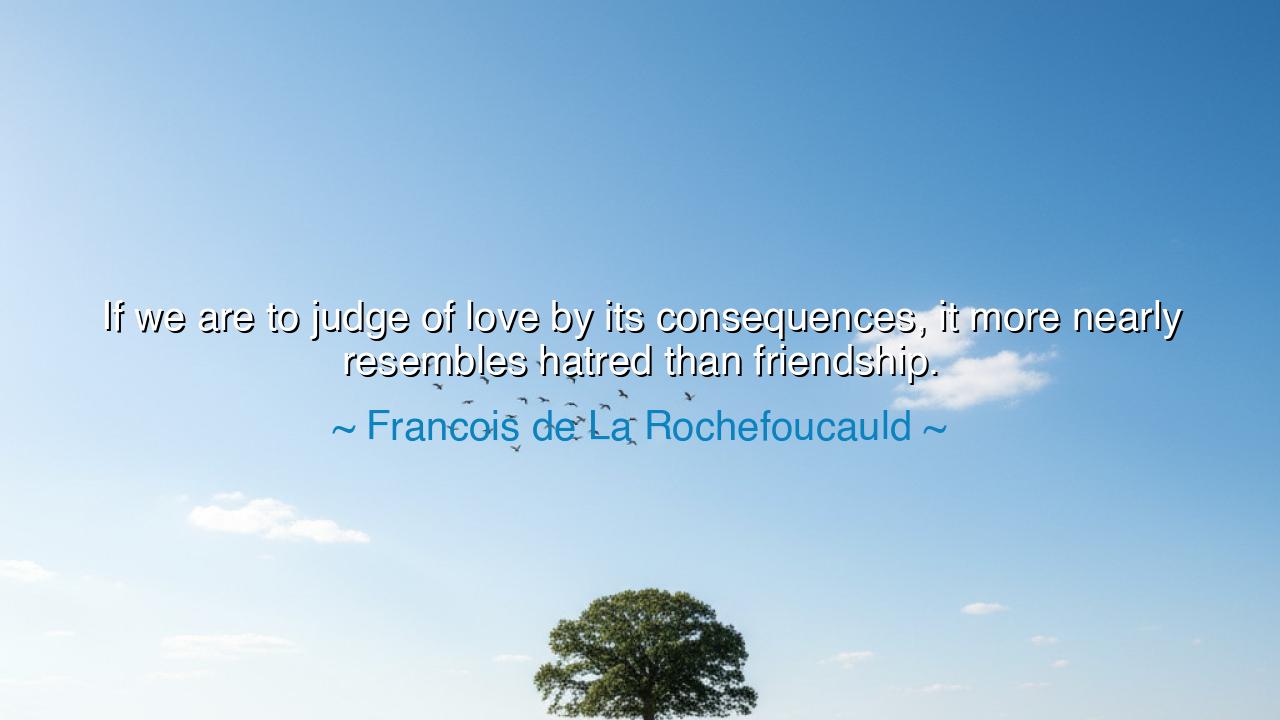
If we are to judge of love by its consequences, it more nearly
If we are to judge of love by its consequences, it more nearly resembles hatred than friendship.






"If we are to judge of love by its consequences, it more nearly resembles hatred than friendship." These words by Francois de La Rochefoucauld cut to the heart of one of the most complex and contradictory forces in the human experience—love. What La Rochefoucauld suggests is that the consequences of love often lead to conflict, pain, and destruction, not unlike the intense emotions that arise from hatred. In his view, love, particularly romantic love, is not the harmonious, beautiful force it is often portrayed to be. Rather, it can be obsessive, jealous, and consuming, leading individuals to act in ways that create discord, betrayal, and ultimately, separation. Friendship, on the other hand, is built on mutual respect and understanding, and its consequences are more enduring and less destructive.
In the ancient world, the nature of love was often debated by philosophers, poets, and thinkers, who sought to understand whether love was a force that united or divided. Socrates, in his discussions in Plato's Symposium, recognized the power of love, but he also spoke of it as a force that could lead individuals to become possessive and distracted. Plato distinguished between love driven by physical attraction and the higher love of the soul—a love that sought to connect individuals through mutual understanding and intellectual growth. However, Socrates also understood that love could drive people to irrational acts of jealousy and anger, causing them to make decisions based on passion rather than reason. La Rochefoucauld seems to capture this tension, suggesting that when love is taken to its extremes, it more closely resembles the destructive force of hatred than the steady bond of friendship.
A prime example of the destructive power of love can be seen in the tragic story of Romeo and Juliet. In Shakespeare’s iconic play, Romeo and Juliet are consumed by their passionate, forbidden love. Their intense feelings for one another, though beautiful and sincere, lead them to act without regard for the consequences. Their families’ hatred for one another fuels the escalating tension, and the love between Romeo and Juliet becomes the catalyst for tragedy. In the end, their love leads to death, not only for themselves but for several others around them. This story echoes La Rochefoucauld’s assertion that love, when unchecked, can lead to destruction—its consequences more closely aligned with the violence of hatred than the nurturing bond of friendship.
In contrast, consider the friendship between David and Jonathan, as told in the Bible. Their bond, though tested by political conflict and familial strife, was rooted in mutual respect, trust, and a shared sense of loyalty. Despite the turmoil around them—Jonathan’s father, King Saul, sought to kill David—the friendship between the two men remained unshaken. Their relationship is defined by sacrifice and honor, and it endures even through death. Jonathan's final act of loyalty—when he chooses to side with David over his father—speaks to the depth of their friendship, which, unlike romantic love, did not lead to destructive outcomes but rather to lasting unity and moral courage. This is an example of friendship’s power, grounded in mutual understanding, which La Rochefoucauld suggests is a far less volatile and destructive force than love.
The lesson we can draw from La Rochefoucauld’s words is that while love can bring great joy, it also carries within it the potential for immense pain and conflict. Love, when it becomes all-consuming and unchecked, can cloud judgment, lead to selfishness, and even destroy relationships. Hatred and love are often born from the same emotional intensity—jealousy, possessiveness, and the desire to control. Friendship, on the other hand, is rooted in mutual respect, shared values, and a commitment to the well-being of the other person without expectation of possession. True friendship does not demand control or fulfillment of personal desires; it simply seeks to nurture and support the other.
In our own lives, we must ask ourselves: Do we approach love with wisdom and balance, or do we allow it to consume us, creating unhealthy patterns and leading us into conflict? How can we cultivate friendships that bring out the best in us, rather than allowing our relationships to turn into a battlefield of emotions? La Rochefoucauld calls us to recognize that while love is a powerful force, it must be tempered with reason and mutual respect. Let us strive for relationships—both romantic and platonic—that are grounded in the deep foundations of mutual understanding, trust, and loyalty, so that we may avoid the destructive consequences that can arise from unchecked love.
As we seek to build stronger relationships, let us take a moment to reflect on the nature of our connections. Are we building them based on mutual respect, or are we allowing our emotions to drive us into jealousy and control? In doing so, we can find balance, ensuring that our friendships and loves are sources of strength and support, not breeding grounds for discord. Like David and Jonathan, let us find the power of true friendship, which, though tested, remains a force of enduring loyalty, trust, and love that does not tear us apart but holds us together.






AAdministratorAdministrator
Welcome, honored guests. Please leave a comment, we will respond soon